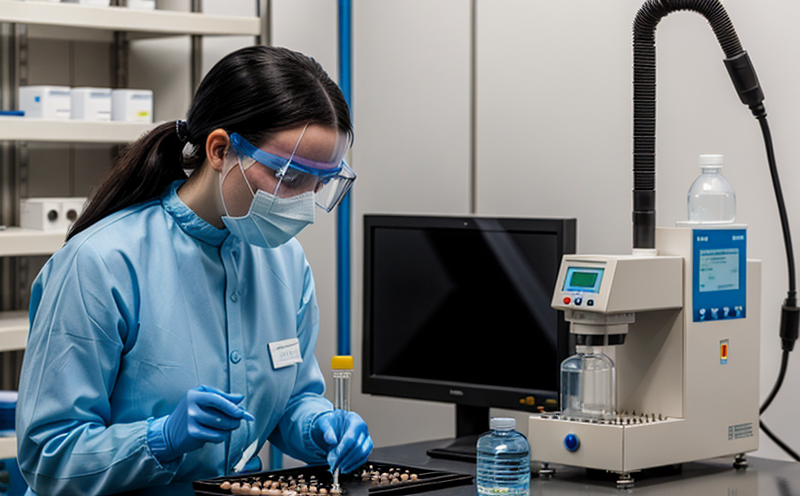TOC Total Organic Carbon Testing
Total Organic Carbon (TOC) testing is a critical analytical procedure used to quantify the amount of organic compounds present in various matrices, primarily water and wastewater. This method is essential for ensuring compliance with environmental regulations and quality standards across industries.
In pharmaceutical manufacturing, TOC analysis plays a pivotal role in confirming the purity of raw materials and intermediates by identifying and quantifying trace amounts of organics. This ensures that only high-quality inputs are used to produce safe medications. The process involves several key steps, including sample preparation, injection into the instrument, and measurement.
The Total Organic Carbon Analyzer (TOC Analyzer) is a sophisticated piece of equipment designed specifically for this purpose. It measures the amount of carbon present as organic compounds in water or other solvents. The TOC test adheres to international standards such as ASTM D6270, ISO 15806, and EN 1484.
Sample preparation is crucial for accurate results. Samples are typically filtered to remove particulate matter and then diluted if necessary. Once prepared, the samples are analyzed using a TOC Analyzer, which oxidizes the organic compounds in the sample to carbon dioxide (CO2). The amount of CO2 produced is directly proportional to the total organic carbon content.
The TOC testing process involves several steps that ensure precision and reliability:
- Sample collection
- Preparation (filtration, dilution)
- Injection into the TOC Analyzer for oxidation
- Data analysis to determine total organic carbon content
The results of a TOC test are typically reported in milligrams per liter (mg/L) or parts per million (ppm). These values provide valuable insights into the purity and quality of the material being tested. In pharmaceuticals, this data is crucial for ensuring compliance with stringent quality control standards.
TOC testing is particularly important in industries where trace amounts of organic compounds can impact product efficacy or safety. By using TOC analysis, manufacturers can ensure that their final products meet all regulatory requirements and are safe for consumption or use.
Why It Matters
The importance of TOC testing cannot be overstated in the pharmaceutical industry. Ensuring the purity of raw materials is paramount to producing high-quality medications that meet regulatory standards and are safe for patients.
Total Organic Carbon testing helps identify and quantify trace amounts of organic compounds, which can affect drug stability and efficacy. This analysis ensures that only pure, uncontaminated substances are used in pharmaceutical formulations.
- Identifies contaminants in raw materials
- Aids in process optimization and quality control
- Ensures compliance with international standards (e.g., ASTM D6270)
- Improves product safety and efficacy
Why Choose This Test
Total Organic Carbon testing is a robust method for assessing the purity of pharmaceutical raw materials. It provides critical insights into potential contaminants that could compromise product quality or safety.
- Precise measurement of organic compounds in water and solvents
- Adherence to international standards (ASTM D6270, ISO 15806)
- Rapid analysis with minimal sample preparation time
- Highly reliable results that enhance product quality assurance
The TOC test is essential for maintaining the highest standards of pharmaceutical manufacturing. By choosing this method, laboratories can ensure they are meeting regulatory requirements and delivering products that are safe and effective.
Competitive Advantage and Market Impact
Total Organic Carbon testing provides a significant competitive advantage in the pharmaceutical sector by ensuring product purity. This method helps companies stay ahead of regulatory changes and maintain a strong market presence.
- Meets strict regulatory requirements (e.g., FDA, EU)
- Aids in process optimization for improved efficiency
- Enhances brand reputation through consistent quality control
- Fosters customer trust by delivering safe and effective products
The market impact of TOC testing is substantial, as it contributes to the overall safety and efficacy of pharmaceutical products. By prioritizing this testing method, companies can ensure they are meeting global standards and maintaining a competitive edge.





